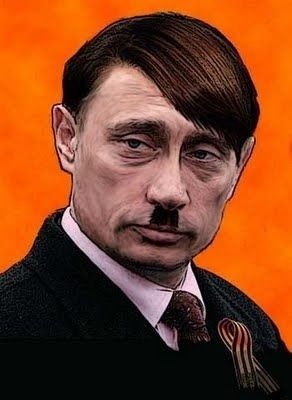Ukrainian Government Issues Arrest Warrant for Aksyonov
The latest in a series of futile gestures surrounding the situation in the Crimea is a warrant for the arrest of the Crimea’s new prime minister, issued by the central government in Kiev:
Â
“A court in the Ukrainian capital of Kiev has issued arrest warrants for the prime minister and parliament speaker of the country’s autonomous republic of Crimea, the Prosecutor General’s office said Wednesday.
Criminal charges had been brought against them and some other politicians in Crimea, said Ukraine’s acting Prosecutor General Oleh Makhnytsky.
Last Thursday, the regional parliament of Crimea appointed Aksyonov, leader of the Russian Unity party, as prime minister in a closed session and announced that a referendum would be held over the future status of the territory on March 30.
Aksyonov said Saturday that he had asked Russian President Vladimir Putin to help ensure peace in the pro-Russian region. Ukrainian Parliament Speaker Alexandr Turchynov, who is also the country’s acting president, later signed a decree to reject Aksyonov’s new capacity.
Â
(emphasis added)
Our guess is that Aksyonov’s resolve has just been strengthened immeasurably. If they really mean it, then he has henceforth nothing left to lose. Just as Kiev thinks his government is illegitimate, so he believes the Kiev government to be illegitimate. The irony is that both governments were proclaimed by the same methods: First, protesters took over government buildings and thereafter, the respective parliamentarians appointed a new government. Both were slightly dubious affairs from a legal standpoint.
Â
Â
Reductio ad Hitlerum
That didn’t take long. First, Saddam was declared to be Hitler. Then, Ahmedinejad became Hitler. Thereafter, Gadaffi became Hitler. Not long after that, Assad became Hitler. And Kim Jong-Un has of course always been Hitler (it may have been more fitting to transform that one into Stalin). Hitler is everywhere!
We knew we should have taken bets on how speedily Putin’s transformation into Hitler would be performed. Hillary Clinton evidently knows her Hitlers when she sees them. Oddly enough, rather obvious fascists like Tyagnybok and Yarosh are still getting a pass.
Â
“Vladimir Putin is a tough but thin-skinned leader who is squandering his country’s potential, Hillary Clinton said on Wednesday, a day after she likened the Russian president’s actions on the Crimean peninsula to those of Adolf Hitler in the 1930s.â€
Â
We’re certainly not exactly big fans of Leo Strauss, but he had the number of people who drag Hitler out of their hat at every opportunity:
Â
“According to Strauss,  Reductio ad Hitlerum is a form of  ad hominem or ad misericordiam, a fallacy of irrelevance, in which a conclusion is suggested based solely on something’s or someone’s origin rather than its current meaning. The suggested rationale is one of guilt by association. Its name is a variation on the term reductio ad absurdum.
Reductio ad Hitlerum is sometimes called “playing the Nazi card.” According to its critics and proponents, it is a tactic often used to derail arguments, because such comparisons tend to distract and anger the opponent.â€
Â
Hillary argues that because Hitler used the ‘I need to protect Germans in Czechoslovakia and/or Romania’ argument to invade these countries, Putin’s invoking of the need to protect Russians in the Ukraine proves he is Hitler. It doesn’t.
Â
Â

Meet Vladimir Hitler, as he appeared to Hillary in a vision.
(Image via back2stonewall.com / Author unknown)
Â
Â
Of course the Washington Post thinks Hillary is on to something because ‘many other people have also compared Putin to Hitler’. It could of course also be that it merely proves that logical fallacies like company.
Â
Sanctions Against Russia?
The next exercise in futility is all the empty blather about imposing sanctions against Russia. In the UK, newspapers inform us: “The majority of Brits want economic sanctions to be imposed on Russia for invading Crimea – but NOT if they hurt usâ€. Don’t worry ye money-launderers in the City, no-one’s going to banish the wads of cash arriving in nice suit-case sized portions from Russian oligarchs. Abe is on the case too: “Japan Is Worried That Western Sanctions On Russia Would Hurt Tokyoâ€. We are probably safe in assuming that Japan will avoid imposing any sanctions. The EU isn’t all that eager either – and neither are some in the US Congress, as it turns out:
Â
“The Obama administration’s plans to impose punitive economic sanctions on Russia — potentially its strongest response to Moscow’s military intervention in Ukraine — already are facing resistance from administration allies in Congress and Europe.
Although administration officials say they are prepared to freeze assets of top Russian officials and possibly target state-run financial institutions, European allies – who are heavily dependent on Russian oil and gas supplies – signaled they aren’t ready to follow suit.
Top Democrats on Capitol Hill also are split, with some, including Senate Majority Leader Harry Reid of Nevada, arguing that the administration should wait for European support to give the sanctions more bite.
[…]
But key European governments, including those in Germany, Britain, France and Italy, indicated in emergency meetings in Brussels that, for now at least, they prefer other routes of persuasion.
The split underscores a broader divide between the United States and Europe, partners in the North Atlantic Treaty Organization alliance for 65 years, over how to deal with Moscow.
The Europeans, closer and more intertwined economically with Russia, don’t share the U.S. enthusiasm for sanctions as a diplomatic tool, and worry that curbing trade and business could hurt them without persuading Russian President Vladimir Putin to withdraw troops from Ukraine’s Crimean peninsula.
Russia is the European Union’s No. 3 trading partner, following only the United States and China. Trade totaled $462 billion in 2012, more than 10 times America’s $40 billion in trade with Russia, mostly between banks, energy companies and consumer products concerns. Europe has little alternative to Russian energy.
[…]
Even authorities in Poland, which this week called for consultations with NATO’s North Atlantic Council because Warsaw said it felt threatened by Moscow’s moves in the region, “fear that it’s not useful to push hard,” Techau said.

